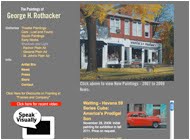24" a 36" Acrylic on Canvas
George H. Rothacker, 2010©
Price: $4500 (plus shipping and handling)
Prints are also available.
Please contact george@rothackeradv.com
During World War II, mobster and murderer Lucky Luciana helped secure the ports in New York Harbor, which helped stop the bombing of U.S. ships by the Germans. As a reward, he was released from prison in the U.S., but then was soon extradited to Italy.
George H. Rothacker, 2010©
Price: $4500 (plus shipping and handling)
Prints are also available.
Please contact george@rothackeradv.com
During World War II, mobster and murderer Lucky Luciana helped secure the ports in New York Harbor, which helped stop the bombing of U.S. ships by the Germans. As a reward, he was released from prison in the U.S., but then was soon extradited to Italy.
Partnering with his childhood chum, Meyer Lansky, Luciana who had lived his whole life in America was instrumental in paving the wave for the mafia to build a stronghold in Cuba, only 90 miles from the Florida.
In 1946, Frank Sinatra was enlisted by Lansky to surreptitiously bring $1 million to Havana to provide a payoff to officials to secure the sanctions necessary to begin building the underworld empire that would include hotels, casinos, restaurants and theatres.
The Payret Theatre, located across from the Presidential Palace in Old Havana, was built in 1878 and restored in 1951. It is the place where Cuban’s experienced the first Cinemascope movie, The Robe, which opened there in 1953.
Many international celebrities, such as French chanteuse Josephine Baker entertained in Havana during the 40s and 50s, and stars such as George Raft, who owned a stake in the Capri Hotel, welcomed guests to parties where cocaine, sex and gambling were offered. Writer Ernest Hemmingway made his home just outside Havana. It was the place where he wrote his final book, “The Old Man and the Sea.”
The person who may have profited the most from government corruption was Cuban President Fulgencio Batista who amassed a personal fortune which he took with him when he was forced to flee by when a Revolutionary army, led by Fidel Castro and Che Guevara, took over Cuba on January 1, 1959.
Since the embargo against Cuba, Havana remains “stuck in time,” and whereas most American movie houses have converted to multiplex use, The Payret remains virtually unchanged, a single screen theatre showing both foreign films and American films.






